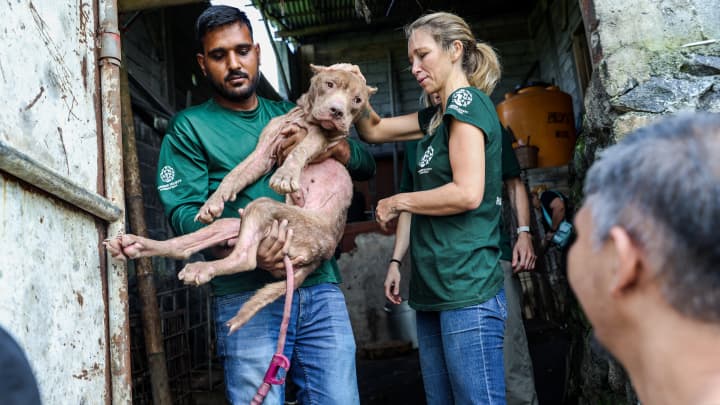
"It's an enormous victory for animal protection and literally the thousands and thousands of dogs and cats that are spared from Tomohon market every month," she said.
The traders were given a "small grant" to stop participating in the trade, she told CNBC Travel, while the coalition of activists lobbied the government about the disease risks of live animal markets, which ranges from viruses like Covid-19 to rabies.
, including the island of Sulawesi, according to the World Health Organization.
The ban of dog and cat meat in the Tomohon market is a step in the right direction, but problems with the trade don't end there, said Michael Patching, chairperson of Impetus Animal Welfare.
One issue is an influx of stray animals, he said. "Bali dealt with this issue by poisoning stray dogs, which ended up being just as bad, if not worse, than those that have been subjected to the dog meat trade."
To combat this, the Dog Meat Free Indonesia coalition is supporting programs to spay, neuter and vaccinate dogs and cats in Indonesia, said Webber.
She said she hopes to use the Tomohon market ban as a precedent to work with government, market management, meat traders and the public in other provinces where dog meat is eaten too.
Polling suggests only 5% of Indonesia's population has ever tried it, said Webber. Yet there are hot spots where it's eaten, like Java's Surakarta (or Solo) and North Sulawesi, the latter being a predominantly Christian enclave in a Muslim-majority nation. (Like pigs, dogs are viewed as being unclean, and therefore not suitable for consumption, in the Muslim faith.)
In those areas, activists raise public awareness of the cruelty of the trade and the trafficking that goes along with it, which often involves the theft of family pets.
"We've interviewed so many people who've had their dogs and cats stolen," Webber said.
Many activists who spoke to CNBC Travel said poor governance is the biggest hurdle to ending the dog and cat meat trade.
Frank Delano Manus, an animal rights advocate at Animal Friends Manado Indonesia, said 95% of North Sulawesi's exotic animal meat is sent from neighboring provinces — without government checks or quarantine regulations.
Indonesian officials did not immediately respond to CNBC's request for comment.
When his organization tried to ban the sale of snake and bat meat when the pandemic hit in 2020, it received a "flat response" from the government, he said.
"When people ask me what's the number one problem in Indonesia, I always say it's the lack of law enforcement," Manus told CNBC.
The sale of dog meat is illegal other parts of Asia, including Singapore, Philippines, Thailand, Hong Kong and Taiwan. But the industry lives on in places like China and South Korea — and Vietnam.
"While all the focus has been on South Korea, Indonesia and other countries, Vietnam's dog and cat meat trade has continued to thrive," said Rahul Sehgal, director of international advocacy at the Soi Dog Foundation, adding that "millions of signatures" on online petitions have not made a difference.
"In Vietnam, every third shop is a pet grooming salon, every fifth shop is a pet supply store, but every twentieth shop is a slaughterhouse or a restaurant that is selling dog or cat meat," he told CNBC, adding that it's eaten for cultural, superstitious and medicinal purposes.
"Just like how the Chinese use rhino horns or tiger bones for traditional medicine, cat bones are said to cure a host of illnesses like asthma," he said. "But there is no scientific basis to this."
Though Tomohon Extreme Market was once marketed as a tourist attraction — and in some places, — the dog and cat meat ban may bring in more travelers to North Sulawesi.
In a on March 5, a user discusses reading about Sulawesi's dog meat trade.
The post states: "Well the next trip was going to be to Sulawesi, Indonesia ... I don't care what you eat, but torture should not be a part of it. Therefore I cannot in good conscience travel there."
Negative media attention frustrated the dog meat traders, Webber said.
"People would see it, and feel very strongly about it," she said. "International tourists, national tourists, and locals themselves didn't want to see that degree of brutality."




